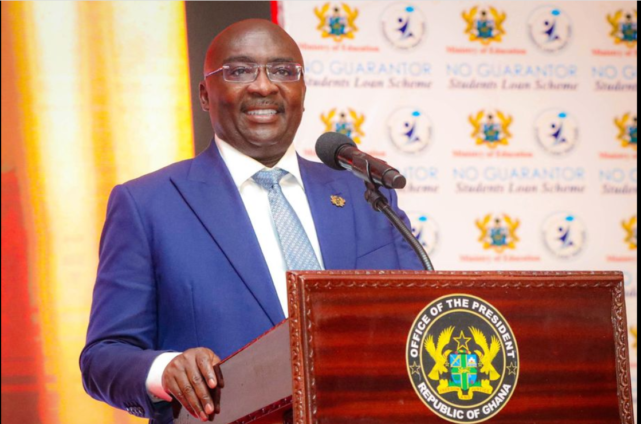Dr Mahamudu Bawumia, the Vice President, has urged players in the petroleum industry to take advantage of opportunities presented by the African Continental Free Trade Area (AfCFTA) to strengthen the sector and promote sustainable development.
He said the AfCFTA offered great opportunities for the petroleum downstream industry, indicating that with the removal of trade barriers, AfCFTA had the potential to enhance market access, stimulate investment, and drive economic growth.
“We must capitalise on these opportunities to strengthen our industry and promote sustainable development across the continent.”
The Vice President said this in a speech read on his behalf by Mr Herbert Krapa, Minister of State in charge of the Ministry of Energy, at the opening of the 6th Ghana International Petroleum Conference (GHIPCON), in Accra, on Wednesday.
Held on the theme: “The Petroleum Downstream: Building a Future for Growth, Efficiency, and Sustainability”, the two-day conference brought together local, regional and international petroleum downstream experts, leaders, and innovators.
The key objective was to discuss the regulatory frameworks and other related issues in Ghana’s downstream petroleum sector.
Dr Bawumia said the petroleum industry grappled with many challenges – from geopolitical tensions to technological advancements and environmental concern.
Additionally, he said, today, industry boundaries were blurring because several oil and gas companies were extending beyond traditional revenue streams.
The price of a barrel of oil, he said, was now rivalled by several other considerations, adding that many were now emphasising customer needs, and diversifying to include new revenue streams such as biofuels, advanced chemicals, hydrogen, LNG, compressed natural gas, autonomous transport-on-demand initiatives, electrical charging stations, renewable energy, and even, expanding retail outlets.
Dr Bawumia therefore, charged industry players to optimise their operations and embrace modern technology to achieve the desired results for the sector, noting that efficiency, growth, and sustainability were key to a thriving downstream supply chain.
“We need to invest in infrastructure, leverage cutting-edge technology, and enhance our supply chain resilience to secure our energy future,” he stressed.
He also urged industry players to move toward more sustainable practices, create long-term strategy for foundational change that considered sustainability in every process, as well as use data to influence decisions on implementing sustainable practices at the design, engineering, and manufacturing stages to track, measure, and reduce emissions every step of the way.
“We must encourage transport and delivery methods that optimise loads, and reduce mileage, emissions, and carbon footprint, we must source materials ethically and in the most sustainable way possible, and we must operate assets and equipment in the most energy-efficient manner, protecting the environment and ensuring workforce safety,” Dr Bawumia stressed.
The Vice President expressed Government’s commitment to increasing participation of Ghanaians in all segments of the downstream petroleum value chain, explaining that Ghanaian content and participation were crucial for the long-term success of the industry.
He said Government would, therefore, continue to promote and explore policies that enhanced Ghanaian content, support capacity building, and create opportunities for the Ghanaian people.
“That way, we can guarantee that the benefits of our resources are widely shared, while ensuring the development of our local workforce and businesses,” he said.
Dr Mustapha Abdul Hamid, Chief Executive Officer of the National Petroleum Authority (NPA), said the downstream petroleum had evolved over the years to be a significant contributor to Ghana’s GDP.
The industry, he indicated, had over 3,000 service providers with heavy Ghanaian participation, delivering over four million metric tonnes of petroleum product to Ghanaians, annually.
“We estimate that the sector’s monetary value stands at over GHC71 billion, representing about 8.4 per cent of the country’s GDP in 2023,” he added.
Dr Hamid expressed NPA’s commitment to formulating and implementing innovative strategies and policies that would ensure that the industry remained efficient and profitable while providing value for money for consumers.
Latest Stories
-
Center for Learning and Childhood Development Director Dr Kwame Sakyi honoured at Ghana Philanthropy Awards
2 hours -
Asantehene receives 28 looted artefacts
2 hours -
CAF WCL 2024: Ghana’s Thelma Baffour wins title with TP Mazembe
3 hours -
Benjamin Boakye slams politicisation of energy sector issues and ECG’s inefficiencies
3 hours -
Erastus Asare Donkor and Dr Neta Parsram win big at 10th Mining Industry Awards
4 hours -
Government is “suppressing information” about power sector challenges – IES Director
4 hours -
Majority of our debts caused by forex shortfall – ECG Boss
4 hours -
Pan-African Savings and Loans supports Ghana Blind Union with boreholes
5 hours -
Bole-Bamboi MP Yussif Sulemana donates to artisans and Bole SHS
5 hours -
Top up your credit to avoid potential disruption – ECG to Nuri meter customers
5 hours -
Dutch & Co wins 2024 Entrepreneur of the Year Award
5 hours -
We’ll cut down imports and boost consumption of local rice and other products – Mahama
8 hours -
Prof Opoku-Agyemang donates to Tamale orphanage to mark her birthday
9 hours -
Don’t call re-painted old schools brand new infrastructure – Prof Opoku-Agyemang tells gov’t
9 hours -
Sunon Asogli plant will be back on stream in a few weeks – ECG
9 hours

